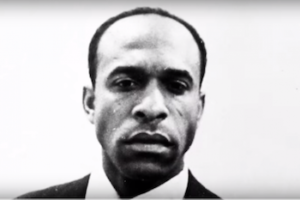
Franz Fanon
*Frantz Fanon was born on this date in 1925. He was an Afro Caribbean author, psychiatrist, and political philosopher. Frantz Omar Fanon was born on the Caribbean island of Martinique.
His father, Félix Casimir Fanon, was a descendant of African slaves and worked as a customs agent. His mother, Éléanore Médélice, was of Afro Martinican and white-Alsatian descent and worked as a shopkeeper. Frantz was the third of four sons in a family of eight children. Two of them died young, including his sister Gabrielle, with whom Frantz was very close. His family was socioeconomically middle-class. They could afford the fees for the Lycée Schoelcher, at the time the most prestigious high school in Martinique, where Fanon came to admire one of the school's teachers, poet and writer Aimé Césaire.
After France fell to the Nazis in 1940, Vichy French naval troops were blockaded on Martinique. Forced to remain on the island, French sailors took over the government from the Martinique people and established a collaborationist Vichy regime. In the face of economic distress and isolation under the blockade, they instituted an oppressive regime; Fanon described them as taking off their masks and behaving like "authentic racists." Residents made many complaints of harassment and sexual misconduct by the sailors. The abuse of the Martinique people by the French Navy influenced Fanon, reinforcing his feelings of alienation and his disgust with colonial racism.
Fanon left Martinique in 1943, at the age of 18, to join the Free French forces. He enlisted in the Free French army and joined an Allied convoy that reached Casablanca. He was later transferred to an army base on the coast of Algeria. In 1944, he was wounded at Colmar. When the Nazis were defeated, and Allied forces crossed the Rhine into Germany along with photojournalists, Fanon's regiment was "bleached" of all non-white soldiers. Fanon and his fellow Afro Caribbean soldiers were sent to Toulon (Provence). Later, they were transferred to Normandy to await repatriation. During the war, Fanon was exposed to white European racism.
In 1945, Fanon returned to Martinique. He lasted a short time there. He worked on Césaire's parliamentary campaign. Fanon stayed long enough to complete his baccalaureate and then went to France, where he studied medicine and psychiatry. Fanon was educated in Lyon, where he studied literature, drama, and philosophy, sometimes attending Merleau-Ponty's lectures. During this period, he wrote three plays, of which two survive. After qualifying as a psychiatrist in 1951, Fanon undertook a residency in psychiatry at Saint-Alban-sur-Limagnole under the guidance of the radical Catalan psychiatrist François Tosquelles, who influenced Fanon's thinking by emphasizing the role of culture in psychopathology.
After his residency, Fanon practiced psychiatry at Pontorson, near Mont Saint-Michel, for another year and then (from 1953) in Algeria. He was chef de service at the Blida–Joinville Psychiatric Hospital in Algeria. He worked there until being deported in January 1957. While working as a physician and psychiatrist, Fanon supported Algeria's War of Independence from France and was a member of the Algerian National Liberation Front. His works have influenced post-colonial studies, critical theory, and Marxism. In addition to being an intellectual, Fanon was a political radical, Pan-Africanist, and Marxist humanist, concerned with the psychopathology of colonization and the human, social, and cultural consequences of decolonization.
For more than five decades, the life and works of Fanon have inspired national liberation movements and other radical political organizations in Palestine, Sri Lanka, South Africa, and the United States. He formulated a model for community psychology, believing that many mental health patients would do better if they were integrated into their families and communities instead of being treated with standardized care. He also helped found the field of institutional psychotherapy while working at Saint-Alban under François Tosquelles and Jean Oury. Frantz Fanon died on December 6, 1961.